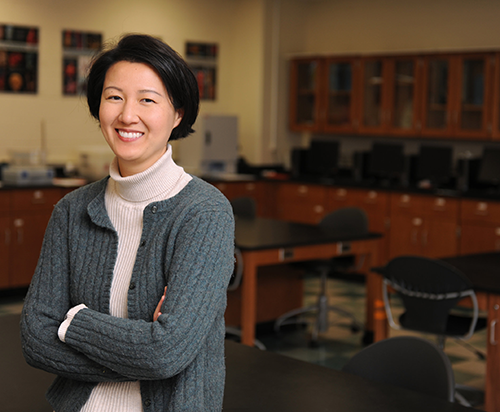For Emily Kang, Ph.D., assistant professor in Adelphi’s Ruth S. Ammon School of Education, TEP was the perfect laboratory for road-testing her own scholarship on teacher quality and its influence on student performance.

Emily Kang, Ph.D.
The equity project (TEP) charter school in New York City’s Washington Heights neighborhood is a bold test of the premise that teacher quality is the most important factor in achieving educational parity.
To attract top-notch teachers, the school, which expresses a commitment to serving “high-need, at-risk” students, pays teachers high wages—$125,000 base salary plus an annual bonus of up to $25,000. There is no tenure, and teachers are expected to work from 7:30 in the morning until 5:00 in the evening. The teachers are vetted through a rigorous application and interview process.
For Emily Kang, Ph.D., assistant professor in Adelphi’s Ruth S. Ammon School of Education, TEP was the perfect laboratory for road-testing her own scholarship on teacher quality and its influence on student performance.
In 2010–2011—one year after joining Adelphi’s faculty—Dr. Kang took a leave of absence to teach sixth-grade science at TEP. Securing the TEP position was a job in itself. Ultimately, she was selected from a group of at least 70 other applicants from across the country. “Somehow, I was offered the job,” she said.
Dr. Kang had taught science in suburban California for eight years before coming to Adelphi. But, she said, that experience was a world away from what she encountered at TEP. A much larger proportion of the TEP students were English-language learners and most were from significantly less wealthy backgrounds. “In my eight years prior, if you had a fun lesson, the kids would love it,” she said.
At TEP, she learned firsthand the importance of gaining students’ trust. “You can have amazing science lessons and cool experiments, but the students will have none of it unless they know that you’re there for them and care for them no matter what,” she said.
Dr. Kang admitted that it took her a few months to adjust. She worked inside and outside of classroom hours to make more personal connections with her students. She even ran a cooking class during the extended-day program. “By the end of the year, I got it,” she said. “They loved science. They loved being in class. Kids would come running to class because they were excited to be part of it.”
She also collected data on different types of learners, particularly those who were new to English. She learned that repetition was important. “If you ever look at the language on standardized tests, the academic language is very difficult,” she said. The wording can trip up students, even if they know the concepts. She found that relating science concepts to students’ lives and explicitly supporting academic language development boosted outcomes on her benchmark assessments.
Ultimately, Dr. Kang said that the experience “enriched my ability as a teacher-educator and professional development provider.” She added: “My experience at TEP has been invaluable in understanding how to best support new and experienced teachers in helping diverse students experience socio-emotional and academic success within the high stakes educational environment.”